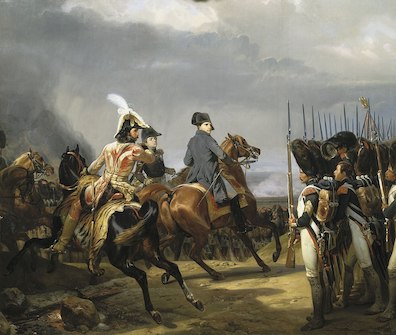
Napoleon reprimanding the grenadier who shouted "En avant" in a
1836 Horace Vernet oil painting held in the Galerie des
Batailles of the Palace of Versailles. Source: Wikimedia
Commons.
En avant!
The first military flourish on the tramp to Burke's pub comes in French: "En avant, mes enfants! Fire away number one on the gun." Literally "Forward (my children!)," en avant is a phrase associated with military advances, like the English "Forward, march!" The obscure reference to cannon fire in the next sentence reinforces one's sense that it should be read this way, and an allusion to the Napoleonic wars may also be at work. The speaker is unquestionably Lenehan, who spouts French phrases throughout the novel.
In the twin battles of Jena and Auerstädt, fought in Saxony
on 14 October 1806, Napoleon crushed the Prussian army.
According to legend a grenadier of his Imperial Guard, not yet
engaged, was so eager for action that he shouted out "En
avant!" and was rebuked by the great leader. A dramatic
oil painting by Horace Vernet shows Napoleon wheeling around
in his saddle to confront the hatless and hapless soldier.
Lenehan always has some French or mock-French phrase on his
lips: Pardon, monsieur; Sonnez la cloche!; Conspuez
les Anglais! Perfide Albion!; Conspuez les Français;
Thanky vous. One of these, in Aeolus,
confirms beyond all doubt that he is the one urging "mes
enfants" to press onward to the pub. When Stephen
enters the newspaper office with Mr. O'Madden Burke, Lenehan
cries out, "Entrez, mes enfants!"